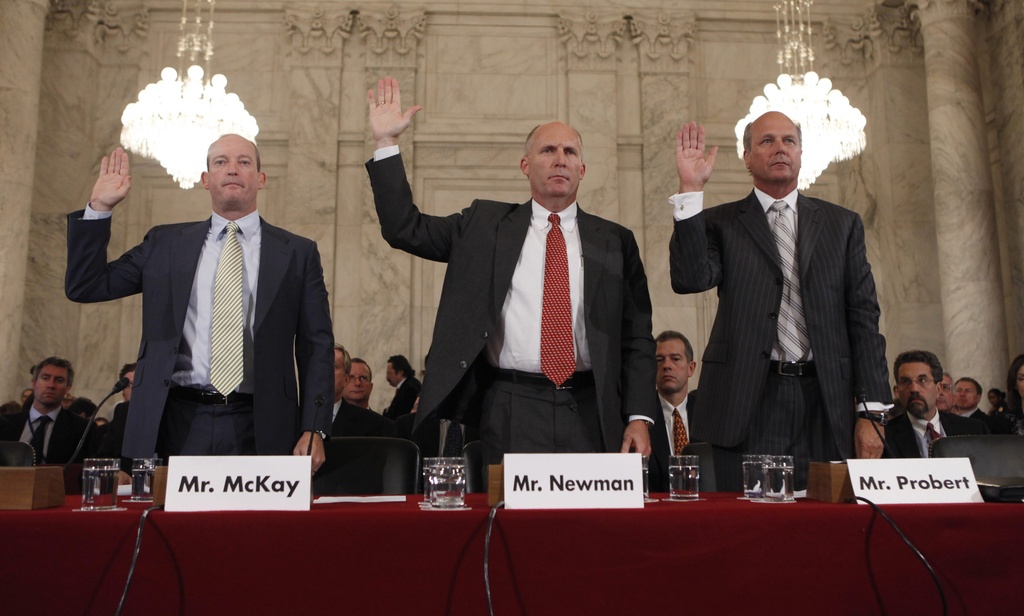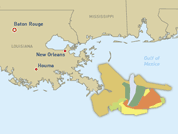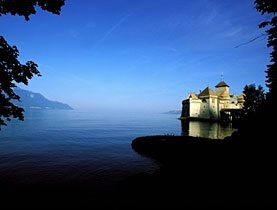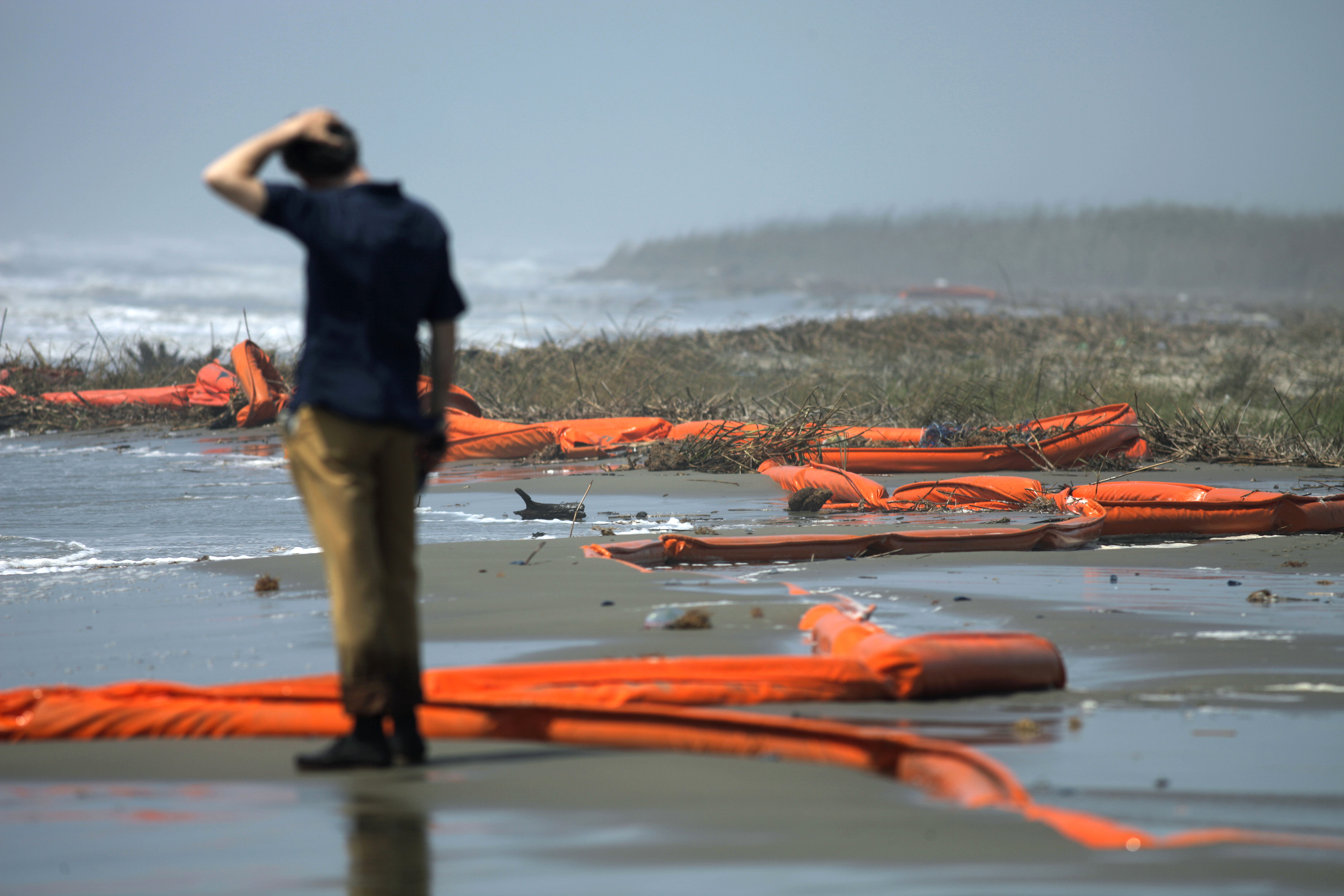Transocean, BP and Halliburton pass the buck

As the oil slick in the Gulf of Mexico continues to spread three weeks after the rig disaster, hearings are underway in Washington to determine responsibilities.
Top representatives of three major players in the oil sector – the Swiss-based drilling contractor Transocean, BP and Halliburton – appeared before the Senate Committee on Energy and Natural Resources on Tuesday, and each cast blame on the other.
The three companies are no strangers to behind-the-scenes lobbying in Washington, but it was a new experience for them to face tough questioning, under oath and in full view of the media.
Transocean president, Steven Newman, promised his company would cooperate with the congressional inquiry and with the joint inquiry being launched by the interior and justice departments. These will attempt to determine why the Deepwater Horizon rig, owned by Transocean, exploded and sank on April 20, causing a number of leaks in the pipeline from the well, which lies at a depth of 1,500 metres below the surface.
Newman assured the committee members that his company followed and even exceeded the safety requirements laid down by United States regulations.
But he denied that it bore responsibility for the disaster, saying that Transocean had leased the rig to BP, which held the concession for the site, and had subcontracted to Halliburton the task of building the casing around the well and its valves.
Lamar McKay, head of BP America, saw things differently. While he assured the hearing that BP would pay the entire cost of the clean up, plus all legitimate requests for compensation from victims of the disaster, he blamed Transocean for the slick, since it was in charge of safety in the drilling operations.
Not to be left out of the blame game, Tim Probert, chief health, safety and environmental officer for Halliburton, laid the responsibility equally on BP and Transocean.
Tougher safety measures
Tuesday’s hearing is only one of several. Other committees of both houses will also be questioning representatives of the companies involved.
Meanwhile, President Barack Obama has ordered that independent scientists should work alongside those of BP, Halliburton and Transocean to try to find solutions on the ground.
The administration has put forward plans to reform and toughen the way in which offshore drilling is supervised. The idea is to split the Minerals Management Service (MMS), an agency of the interior department, that oversees these operations. Under the new plan, responsibility for safety inspections will be separated from the collection of royalties.
The MMS has been criticised in the past as facing a conflict of interests: enforcing safety regulations could reduce the amount of money to be made.
Obama has also said he wants new laws to increase the maximum sum for which oil firms would be liable over such disasters.
Storm clouds over Zug
Transocean has already seen its shares fall by 28 per cent since the explosion of the rig. Newman, who only took over in March, will face the company’s shareholders for the first time at the annual general meeting scheduled for Friday in Zug.
It could turn out to be a stormy meeting, since the Californian investor advocacy group, Shareholders Foundation, Inc., has announced an investigation into “possible securities laws violations” on behalf of long term investors. The aim appears to be to bring a class action in the courts. The foundation had not responded to swissinfo.ch’s request for clarification before this article went on line.
Meanwhile, the well goes on pumping out oil into the Gulf of Mexico. It has already polluted some of the island nature reserves off Louisiana, and has postponed indefinitely the start of the fishing season.
For the moment, all attempts to cap the leaks have failed and the chemical detergents used to disperse the slick have not yet prevented it from spreading.
Marie-Christine Bonzom in Washington, swissinfo.ch (adapted from French by Julia Slater)
On April 20, 2010, an explosion and fire killed 11 crew members and destroyed a Transocean-owned semisubmersible drilling rig called Deepwater Horizon, positioned about 50 miles southeast of Venice, Louisiana, in water nearly 5,000 feet deep.
The rig, one of the largest and most sophisticated in the world, had been under contract to BP, the London-based oil giant, since September 2007.
The Deepwater Horizon accident spewed thousands of barrels of oil a day into the Gulf of Mexico, and experts said it could become the largest oil spill in history.
Attempts at the weekend of May 8-9 to cap the well with a giant metal funnel failed.
BP has a new plan to block the well by ramming rubbish into it.
The Gulf of Mexico accounts for one-third of America’s domestic oil production and one-fourth of its natural gas. There are 90 exploratory rigs working there and about 3,500 oil-producing platforms.
Transocean is the world’s largest offshore drilling contractor.
Although it was established in the US, its headquarters have been in the Swiss town of Zug since 2008.
According to its website it has 138 mobile offshore drilling rigs and 20,000 employees world wide.
Its website describes its safety vision as: conducting its operations “in an incident-free workplace, all the time, everywhere”.
Its clients are global energy firms, national petroleum companies and independent contractors.
It constructs wells for both oil and gas all round the world: the Gulf of Mexico and eastern Canada, Brazil, the British and Norwegian sectors of the North Sea, West Africa, Asia, including Australia and India, the Middle East, including Saudi Arabia, and the Mediterranean.
Shares in Transocean fell by 12 % on the Zurich stock exchange on Friday as a result of the oil spill.
Some experts say BP could ask Transocean, the owner of the rig, to help pay for the clean-up operations.
However, BP, as operator of the rig, has accepted responsibility and says it will compensate those who have suffered from the accident.
US President Obama has also said BP is ultimately responsible for the crisis.


In compliance with the JTI standards
More: SWI swissinfo.ch certified by the Journalism Trust Initiative














You can find an overview of ongoing debates with our journalists here . Please join us!
If you want to start a conversation about a topic raised in this article or want to report factual errors, email us at english@swissinfo.ch.